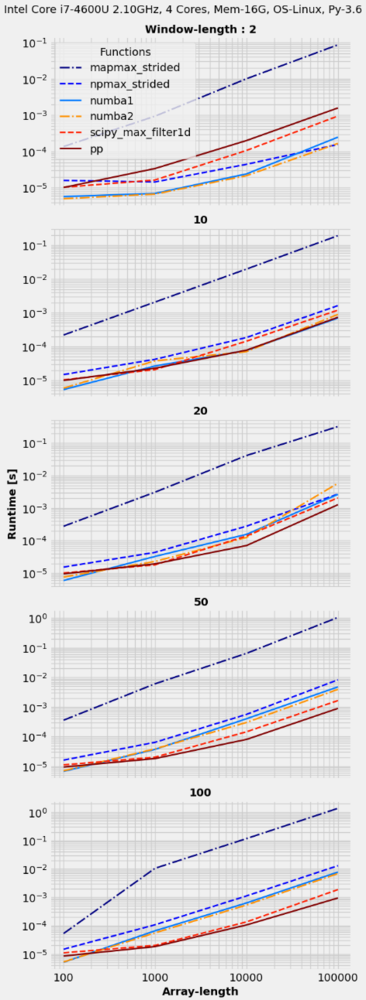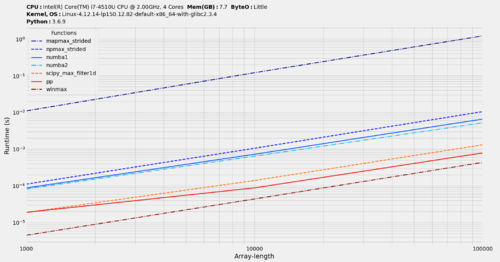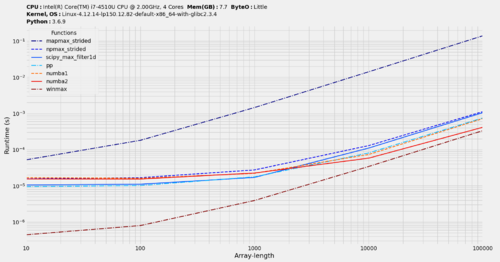6 回答
TA贡献1155条经验 获得超0个赞
无循环解决方案是max在由以下命令创建的窗口上使用skimage.util.view_as_windows:
list(map(max, view_as_windows(A, (2,))))
[8, 33, 33, 4, 6]
复制/粘贴示例:
import numpy as np
from skimage.util import view_as_windows
A = np.array([8, 2, 33, 4, 3, 6])
list(map(max, view_as_windows(A, (2,))))
TA贡献1796条经验 获得超7个赞
在本次问答中,我们基本上要求滑动最大值。之前已经探讨过这一点 - NumPy 数组中滑动窗口中的 Max。由于我们希望提高效率,因此我们可以看得更远。其中之一是numba,这里有两个最终变体,我最终得到了杠杆parallel指令,它比没有版本提高了性能:
import numpy as np
from numba import njit, prange
@njit(parallel=True)
def numba1(a, W):
L = len(a)-W+1
out = np.empty(L, dtype=a.dtype)
v = np.iinfo(a.dtype).min
for i in prange(L):
max1 = v
for j in range(W):
cur = a[i + j]
if cur>max1:
max1 = cur
out[i] = max1
return out
@njit(parallel=True)
def numba2(a, W):
L = len(a)-W+1
out = np.empty(L, dtype=a.dtype)
for i in prange(L):
for j in range(W):
cur = a[i + j]
if cur>out[i]:
out[i] = cur
return out
从之前链接的问答中,等效的 SciPy 版本将是 -
from scipy.ndimage.filters import maximum_filter1d
def scipy_max_filter1d(a, W):
L = len(a)-W+1
hW = W//2 # Half window size
return maximum_filter1d(a,size=W)[hW:hW+L]
标杆管理
其他发布的通用窗口 arg 的工作方法:
from skimage.util import view_as_windows
def rolling(a, window):
shape = (a.size - window + 1, window)
strides = (a.itemsize, a.itemsize)
return np.lib.stride_tricks.as_strided(a, shape=shape, strides=strides)
# @mathfux's soln
def npmax_strided(a,n):
return np.max(rolling(a, n), axis=1)
# @Nicolas Gervais's soln
def mapmax_strided(a, W):
return list(map(max, view_as_windows(a,W)))
cummax = np.maximum.accumulate
def pp(a,w):
N = a.size//w
if a.size-w+1 > N*w:
out = np.empty(a.size-w+1,a.dtype)
out[:-1] = cummax(a[w*N-1::-1].reshape(N,w),axis=1).ravel()[:w-a.size-1:-1]
out[-1] = a[w*N:].max()
else:
out = cummax(a[w*N-1::-1].reshape(N,w),axis=1).ravel()[:w-a.size-2:-1]
out[1:N*w-w+1] = np.maximum(out[1:N*w-w+1],
cummax(a[w:w*N].reshape(N-1,w),axis=1).ravel())
out[N*w-w+1:] = np.maximum(out[N*w-w+1:],cummax(a[N*w:]))
return out
使用benchit包(很少有基准测试工具打包在一起;免责声明:我是它的作者)对建议的解决方案进行基准测试。
import benchit
funcs = [mapmax_strided, npmax_strided, numba1, numba2, scipy_max_filter1d, pp]
in_ = {(n,W):(np.random.randint(0,100,n),W) for n in 10**np.arange(2,6) for W in [2, 10, 20, 50, 100]}
t = benchit.timings(funcs, in_, multivar=True, input_name=['Array-length', 'Window-length'])
t.plot(logx=True, sp_ncols=1, save='timings.png')

因此,numba 非常适合小于 的窗口大小10,此时没有明显的赢家,而在较大的窗口大小上,ppSciPy 则排名第二。
TA贡献1839条经验 获得超15个赞
这是专门为较大窗户设计的方法。窗口大小为 O(1),数据大小为 O(n)。
我已经完成了纯 numpy 和 pythran 实现。
我们如何在窗口大小上实现 O(1) ?我们使用“锯齿”技巧:如果 w 是窗口宽度,我们将数据分为很多 w ,对于每个组,我们从左到右和从右到左求累积最大值。任何中间窗口的元素分布在两组中,并且交集的最大值位于我们之前计算的累积最大值之中。因此,每个数据点总共需要 3 次比较。
benchit w=100;我的函数是 pp (numpy) 和 winmax (pythran):

对于小窗口尺寸 w=5,图像更加均匀。有趣的是,即使对于非常小的尺寸,pythran 仍然具有巨大的优势。他们必须采取正确的措施来最大限度地减少呼叫开销。

蟒蛇代码:
cummax = np.maximum.accumulate
def pp(a,w):
N = a.size//w
if a.size-w+1 > N*w:
out = np.empty(a.size-w+1,a.dtype)
out[:-1] = cummax(a[w*N-1::-1].reshape(N,w),axis=1).ravel()[:w-a.size-1:-1]
out[-1] = a[w*N:].max()
else:
out = cummax(a[w*N-1::-1].reshape(N,w),axis=1).ravel()[:w-a.size-2:-1]
out[1:N*w-w+1] = np.maximum(out[1:N*w-w+1],
cummax(a[w:w*N].reshape(N-1,w),axis=1).ravel())
out[N*w-w+1:] = np.maximum(out[N*w-w+1:],cummax(a[N*w:]))
return out
pythran 版本;编译用pythran -O3 <filename.py>; 这将创建一个可以导入的已编译模块:
import numpy as np
# pythran export winmax(float[:],int)
# pythran export winmax(int[:],int)
def winmax(data,winsz):
N = data.size//winsz
if N < 1:
raise ValueError
out = np.empty(data.size-winsz+1,data.dtype)
nxt = winsz
for j in range(winsz,data.size):
if j == nxt:
nxt += winsz
out[j+1-winsz] = data[j]
else:
out[j+1-winsz] = out[j-winsz] if out[j-winsz]>data[j] else data[j]
running = data[-winsz:N*winsz].max()
nxt -= winsz << (nxt > data.size)
for j in range(data.size-winsz,0,-1):
if j == nxt:
nxt -= winsz
running = data[j-1]
else:
running = data[j] if data[j] > running else running
out[j] = out[j] if out[j] > running else running
out[0] = data[0] if data[0] > running else running
return out
TA贡献1815条经验 获得超6个赞
如果存在连续的n项目,则扩展解决方案需要循环:
np.maximum(*[A[i:len(A)-n+i+1] for i in range(n)])
为了避免这种情况,您可以使用跨步技巧并将其转换A为n-length 块的数组:
def rolling(a, window):
shape = (a.size - window + 1, window)
strides = (a.itemsize, a.itemsize)
return np.lib.stride_tricks.as_strided(a, shape=shape, strides=strides)
例如:
>>> rolling(A, 3)
array([[ 8, 2, 8],
[ 2, 8, 33],
[ 8, 33, 33],
[33, 33, 4]])
完成后你可以用 杀死它np.max(rolling(A, n), axis=1)。
尽管它很优雅,但这个解决方案和第一个解决方案都不是高效的,因为我们在仅相差两项的相邻块上重复应用最大值。
TA贡献1830条经验 获得超3个赞
对于所有 n 的递归解决方案
import numpy as np
import sys
def recursive(a: np.ndarray, n: int, b=None, level=2):
if n <= 0 or n > len(a):
raise ValueError(f'len(a):{len(a)} n:{n}')
if n == 1:
return a
if len(a) == n:
return np.max(a)
b = np.maximum(a[:-1], a[1:]) if b is None else np.maximum(a[level - 1:], b)
if n == level:
return b
return recursive(a, n, b[:-1], level + 1)
test_data = np.array([8, 2, 33, 4, 3, 6])
for test_n in range(1, len(test_data) + 2):
try:
print(recursive(test_data, n=test_n))
except ValueError as e:
sys.stderr.write(str(e))
输出
[ 8 2 33 4 3 6]
[ 8 33 33 4 6]
[33 33 33 6]
[33 33 33]
[33 33]
33
len(a):6 n:7
关于递归函数
你可以观察下面的数据,然后你就会知道如何写递归函数了。
"""
np.array([8, 2, 33, 4, 3, 6])
n=2: (8, 2), (2, 33), (33, 4), (4, 3), (3, 6) => [8, 33, 33, 4, 6] => B' = [8, 33, 33, 4]
n=3: (8, 2, 33), (2, 33, 4), (33, 4, 3), (4, 3, 6) => B' [33, 4, 3, 6] => np.maximum([8, 33, 33, 4], [33, 4, 3, 6]) => 33, 33, 33, 6
...
"""
添加回答
举报
